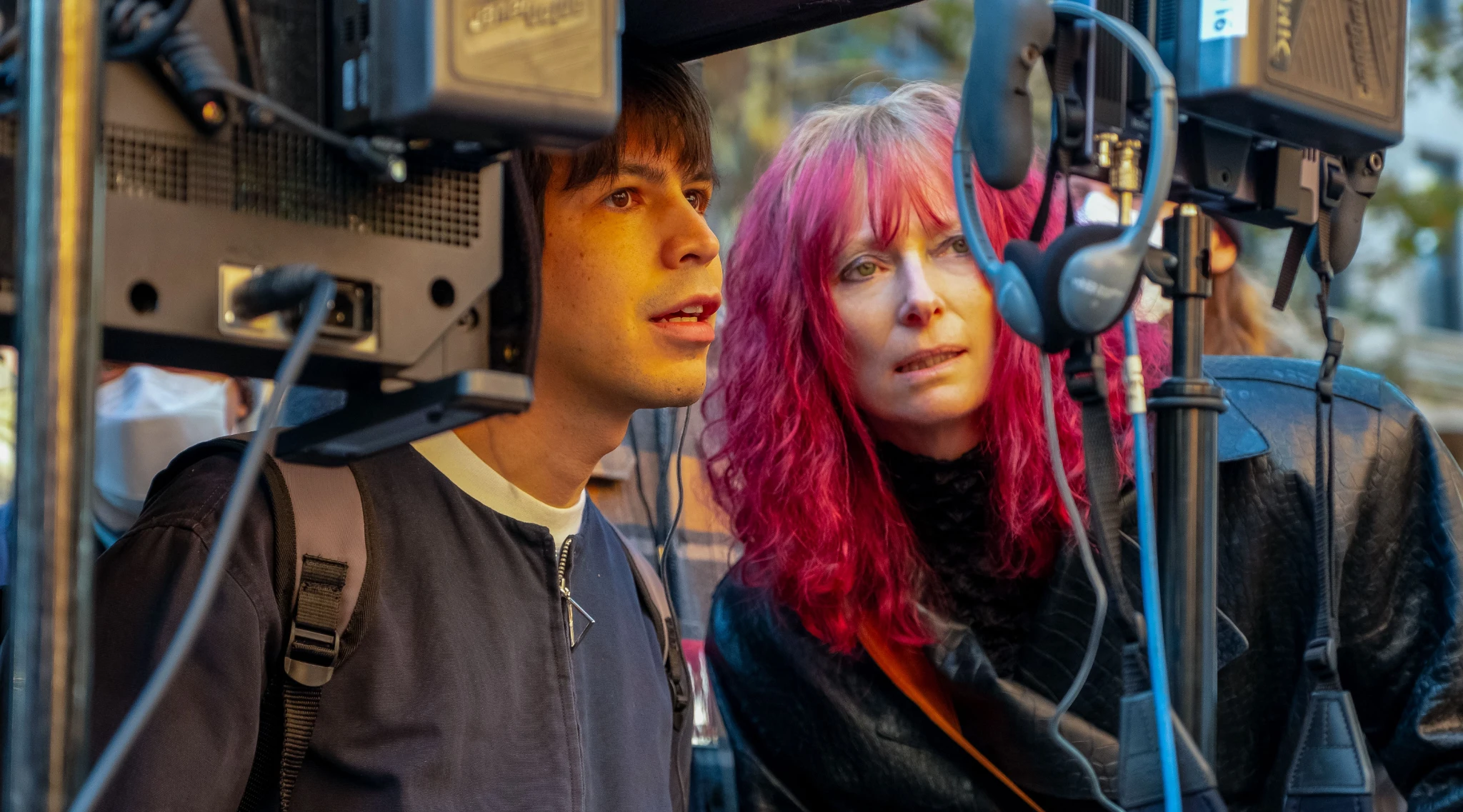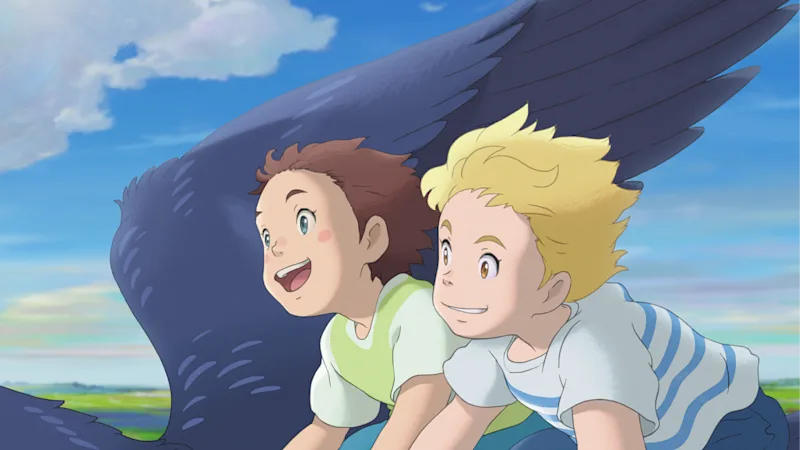Problemista is the culmination of 37-year-old Julio Torres' entire life and career to this point.
The whimsically oddball comedy follows Alejandro (Torres), an El Salvadoran immigrant who moves to New York City in the hopes of becoming a successful toy designer. However, with his work visa on the verge of expiring, Alejandro is forced to take a job as an assistant to a venomous art critic to keep his dreams alive. Problemista's story is a personal one for Torres, who similarly left his home country of El Salvador as a young adult and relocated to New York to pursue his dreams.
Despite its autobiographical elements, Torres says that he only committed to making the film, which serves as his feature directorial debut, after he figured out the movie's surreal aesthetic. "It all began with my realization that I could tell this story in a visually fantastic, odd fashion," he says. "I realized that I not only felt comfortable in the world of the movie but that I was really interested in telling a semi-autobiographical story in this very specific way."
As emotionally grounded as its story is, Problemista leans into the same off-kilter sensibilities that are on full display in Los Espookys, the HBO series Torres co-created, or any of the sketches that he penned during his five-year tenure at Saturday Night Live. What Torres never could have imagined when he first began to write Problemista is that his past work had already earned him the admiration of his future co-star, Oscar winner Tilda Swinton.
"I was always going to be interested in anything Julio did," Swinton, who plays Alejandro's erratic boss Elizabeth, tells A.frame. "I've loved his work ever since I first saw it, and I loved it for the reason that I tend to love people's work, which is that it creates its own world. It offers an absolute sense of immersion. I find it to be such a generous, kind thing when an artist sends a message to the audience that says, 'You're in safe hands with me. Don't worry. You don't have to second guess what's going to come next. I'm taking care of that. Just rest easy and enjoy the ride as I safely take you through the cogs of my mind.' Julio can do that."
In conversation with A.frame, Torres and Swinton reveal how they brought the bizarrely authentic and authentically bizarre world of Problemista to life.

A.frame: Julio, you have a lot of experience working in the short-form comedy field. How did you know that Problemista was a feature-length idea?
JULIO TORRES: You're right, I have written a lot of television and sketch comedy, but I feel like I never actually learned how to write either of those things. I still feel like I don't know how to write a screenplay. I just know how to do what I do, and sometimes the things I write fit into different boxes. When someone who's interested in sketch comedy asks me, "How do you write a sketch?" I always say, "I don't know! I just write something, and if it's short enough, they make it as a sketch!" With Problemista, the story was just naturally too long for a short-form medium.
Tilda, you have a reputation for seeking out filmmakers who have very distinct perspectives and voices. What is it about working with directors like Julio that you enjoy so much?
TILDA SWINTON: I love the feeling of being taken into someone else's hands and knowing, "Oh, good. I can just relax and trust that this person is going to take me where they want and it'll be great." With Julio, as a fan of his, I was so excited that he wanted to make a feature film. Just as someone who has enjoyed his work, I was into that. I wanted to find out what he was going to do on a big screen, in a feature film format, and in around two hours. And then he produced this perfect script. It felt like he'd taken this feature film-shaped jar and just poured Julio Torres into it. It wasn't all that different from experiencing one of his sketches or TV shows for the first time. I read it and thought, "I want that. I want to be in that, too." It was exactly what I wanted to see from him, so getting to work on it with him was just the freshest opportunity imaginable to me.
How appealing is it as an actor to play a human wrecking ball like Elizabeth, who manages to dominate every space she walks into?
Swinton: It's very interesting. I'm not an actor who knows how to talk about acting, to be honest with you, and I don't really think about it too intensely. But it's true that there must be some sort of therapeutic advantage to playing someone whose instincts are 180 degrees opposite to what my instincts are. Elizabeth is someone who, if you're feeling a little bit delicate and shy, wouldn't tell you to stay quiet. She'd say, "No. Just dominate the space, make a lot of noise, be aggressive, say you're the victim of a situation." She's the exact opposite of me, and it was really, really good fun to play her. At the same time, Julio and I really had to do it together.
I constantly needed Julio's direction. Every day, we'd finish filming and it would be great and outrageous, and I would ask him, "Are you sure it's not too much?" Julio would say, "Absolutely not. It's great." But then we would go home and I would sort of turn back into myself, a fairly Tilda-sized person. I'd go back to set the next day and feel like I was slightly dialing it all back again. Julio would then have to blow me back up like a balloon to fit Elizabeth's shape. It was a strange sensation to be the wrecking ball of the film, but that's exactly what it felt like.

Julio, this is your feature directorial debut. You also wrote and starred in it. What was it like juggling all of those responsibilities on your first project of this size?
Torres: I wouldn't have known how to do it any other way. I always, always, always favor ambitious things. Even if they end up being imperfect, I prefer them over things that are perfectly safe. That's always my instinct. Seeing all of the possibilities of something is more interesting to me than seeing something that was made by someone who learned how to do one thing and played it really safe because they were scared of getting a bad grade, you know? Emotionally, it would have been a lot harder for me to make a movie if I wasn't fully trying to do it myself and make it everything that I hoped it could be.
The film very much plays by its own rules. How easy was it for you to get everyone else to see your vision for Problemista before you could actually bring it to life?
Torres: I feel very, very privileged, honestly, and for two reasons: For starters, I feel very lucky that, by the time I wanted to make Problemista, there was already enough of me and my work out there for people to turn to and make their decisions based on all of that. They could know that, even if something read a little strangely on the page, I did have it under control and had a clear idea of what I wanted to do. They could know that there was a vision there. I also felt very trusted by our producers. No one ever gave me the note that said that something doesn't make sense or, "Could you do a smaller, easier version of this that makes clearer sense?" No one ever said that to me. I genuinely think that good collaborators want you to be the best possible version of yourself, and that's the kind of support that I felt like I had while I was making this film.
Tilda, how easy was it for you to lose yourself in Problemista's surreal, wacky world?
Swinton: Well, I personally think it both is and isn't strange. It's a world I absolutely recognize. I think it is, in many ways, accurate. It's a world that a lot of us live in, or rather we live around it. We may try and live in slightly tidier parts, but it exists. The streets of New York are full of trash, you just don't see that in movies, that's all. Julio has, for once, managed to bring that onto a big screen. You know, people's apartments actually are like how they are in the film, and people's lives are entangled and messy and fraught and difficult. People really are this banged down and desperate, and they do tend to cut themselves off from others because what they're actually worried about are themselves. It's all real in its own way, so the film's world felt very recognizable to me when I read Julio's script for the first time.
Of course, the promise of how it was all going to be brought to life visually was very exciting. I think what Julio, [production designer] Katie Byron, and [costume designer] Catherine George managed to do with all of the design elements of the film is really inspiring. They really took Julio's initial ideas and ran with them. Nobody was frightened of showing the movie's world for what it was, because it's not actually that fantastical. It's very real, and it would, honestly, be really difficult to go too surreal with New York. Even Terry Gilliam can't make New York look or feel too extreme or strange. Nobody can.

You're right. The film never shies away from the messiness of either Alejandro or Elizabeth's lives. What was it like getting the chance to be that real and simultaneously that absurd on-screen?
Torres: I think it's the things that we're often prescribed by movies to absorb as truth that are actually alien and otherworldly and bizarre. I've never heard of anyone taking their engagement ring off and throwing it at their fiancé, you know? I've never once heard of that happening in real life.
Swinton: Never! That doesn't happen.
Torres: However, it happens in movies all the time! That is what we're trained to view as normal, just because someone did it in a film one time and then other movies kept replicating it.
Swinton: Exactly. Have you noticed, for instance, how in most mainstream movies about urban people who have a little bit of money — particularly American movies — that their clothes are always freshly laundered? There are never wrinkles! There are no stains. There's no fraying. They get out of a cab and their coat isn't crumpled up in the back at all. That's not real life!
Torres: To me, a fantasy is seeing a scene at a cafe and the barista has a perfect blowout. It's like, "You mean to tell me that she wakes up at four every day so she can open the cafe at six and she gets a blowout at three in the morning?"
Swinton: And her blowout is not all wrecked by working the cappuccino machine. [Laughs]
Torres: It just stays perfect!
Swinton: And everyone has perfectly powdered faces. Nobody sweats ever. Nobody has shiny foreheads. Everyone has the whitest teeth and the lip line of their lipstick is always absolutely impeccable. That's the world we're supposed to believe in. But just like Elizabeth, everyone's bag, whether it be my bag or someone else's, is too full of things that they don't need. Nobody needs to take that as far as Elizabeth does, but everybody knows that and can recognize it. I think what Julio is doing in this film is showing people what they really know to be true, and not only encouraging them to enjoy seeing that on-screen but also to feel a certain fondness for it.
By Alex Welch
RELATED CONTENT:
Essential Tilda Swinton Movies to Watch
What to Watch: New Movies Releasing in March 2024
Pride Guide: 15 LGBTQ+ Filmmakers and Artists on the Rise in 2023







